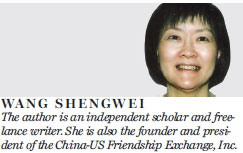HK should join New Silk Road Project
Updated: 2015-03-04 07:46
By Wang Shengwei(HK Edition)
|
|||||||
Remarkable progress has already been made on the proposals presented by President Xi Jinping in 2013 to create the New Silk Road Economic Belt and 21st Century Maritime Silk Road, now known as "One Belt, One Road" (OBOR). Xi sees these challenging projects as the new way forward after China's hugely successful industrial evolution since the 1970s. Most significantly, OBOR has already won the support of nearly 60 countries involved, evidenced by China's signing of a series of agreements with countries including Kazakhstan and Pakistan this month as part of Beijing's plan to stimulate economic development along the ancient Silk Road.
Since 2014, private and State-owned enterprises have mobilized to support the OBOR initiative while Beijing established a supplementary Silk Road Fund of $40 billion. Internationally, China has also proposed the establishment this year of a multilateral Asian Infrastructure Investment Bank (AIIB) to provide infrastructure investment loans to its Asian partners. All this is part of China's goal of positioning itself internationally, with Chinese enterprises seeking to collaborate with foreign countries to learn about new technology and exchange ideas.
More importantly, OBOR offers tremendous opportunities for Hong Kong to become its southern "lynchpin". Consider these basic advantages available here - the world's 4th busiest container port (behind Shanghai, Singapore and Shenzhen) and third financial center (after New York and London) plus the experience it has gained as a springboard for the mainland's transformation into an influential player in world affairs in recent times. Not forgetting that in a few more years our high-speed rail service will be connected with mainland rail networks. Let us therefore seize the opportunities OBOR offers and begin flexing our muscles for the key role we should play.
Firstly, Hong Kong needs to understand that OBOR is not an entity. It is an idea - a grand vision of cooperation and development initiatives. It relies on existing bilateral and multilateral mechanisms between China and other bordering countries or the well-established regional cooperation platforms, and borrows the ancient historical symbolism of the "Silk Road". It also involves overland and maritime routes, but is more than a mere copy. Instead, it is an important strategy for China's future development and a new growth area in its economy, the world's even.

OBOR will develop China's economic partnerships with countries along the Silk Road to build mutual political trust, economic integration and cultural inclusiveness. It is intended to build a common destiny by building markets for both goods and ideas, driven by a cooperative vision without precedent in world history. The regions it encompasses are breathtaking - Central Asia, Western Asia, the Caucasus, South Asia, East Asia, South-East Asia, Europe, Middle East, Africa and more than 20 Chinese provinces and cities; with a combined population of 4.4 billion and annual economic output of $22 trillion. The efforts of cooperation will first be devoted to energy resources, transportation grids (including railways, highways, ports and airports), shipping and sea lanes, electricity systems, communication networks, basic infrastructures and networking platforms. Then it will expand to agriculture, advanced manufacturing, modern services (including financial services), marine economies and other areas. OBOR's development can prosper only when human resources, logistics, technologies and economic flow have been brought on-line and integrated.
Let us now consider what Hong Kong can bring to the table - international connections, the rule of law, an independent judiciary, efficient and clean government, technological sophistication, market economy, the free flow of ideas, business experience, human resources, capital and financial services (including consultancy, investment, lending and risk hedging mechanisms). Hong Kong also enjoys vibrant cross-boundary cooperation with Shenzhen's manufacturing industry and other industrial hubs on the mainland. All these factors can neatly mesh with OBOR's much broader platform.
(HK Edition 03/04/2015 page10)